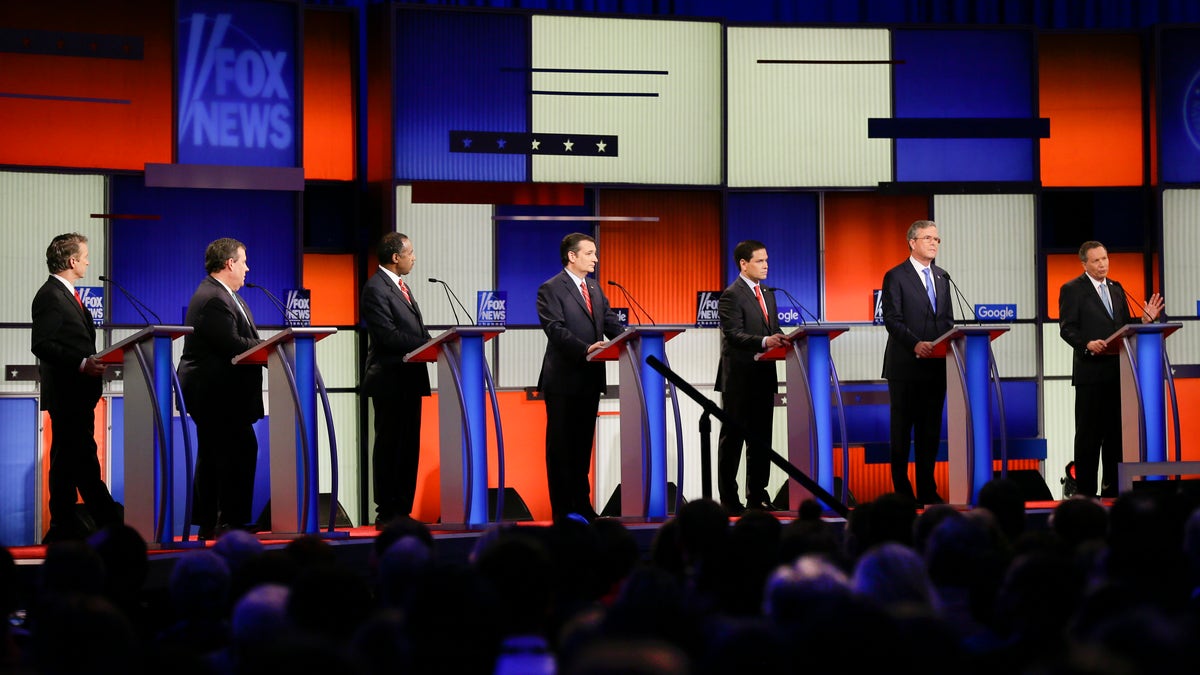
Republican presidential candidate Ohio Gov. John Kasich, right, answers a question as (L-R) Sen. Rand Paul, R-Ky., New Jersey Gov. Chris Christie, retired neurosurgeon Ben Carson, Sen. Ted Cruz, R-Texas, Sen. Marco Rubio, R-Fla., and former Florida Gov. Jeb Bush listen during a Republican presidential primary debate, Thursday, Jan. 28, 2016, in Des Moines, Iowa. (AP Photo/Charlie Neibergall)
If you’re someone who pays attention to politics, already it feels like it’s been a long campaign. There has been months of coverage and speculation, hundreds of opinion polls, hours and hours of reporting and endless campaign rhetoric.
But for all that, not a single vote for president has been cast anywhere in the United States. Airwaves and social media outlets have been filled with analyses and opinions about which candidates may win or lose and what that could mean for the country, but the reality is that nothing has been decided yet.
That begins to change next week.
Unsurprisingly then, Thursday night’s Republican debate in Iowa started off with the usual, almost existential questions and answers about the relationship between the individual candidates and the media and the future of the Republican party.
However, the discussion rather quickly took a turn to a serious – and much more tangible, more easily relatable – place: the economic reality of daily life for many Americans.
A number of candidates rightly pointed out that there is a chasm between what is talked about in the news and what questions are being asked by citizen voters at town halls and rallies across the country. Real Americans – the people who’ll be doing the actual voting – don’t ask about some struggle between the establishment and the grassroots.
Instead, they raise concerns about real issues that people are struggling with every day: unemployment, student debt, breaking the cycle of poverty and unaffordable health care.
For those like me who find this particular campaign cycle fascinating, with its discussions about the trajectory of American politics, it is important to keep watching. But the pure politics of it all is so far removed when contrasted with the stories of families struggling to make ends meet day after day.
During last night’s debate, the two questions posed to the candidates by video were from young, minority women concerned about rhetoric and inflammatory statements surrounding the issues of immigration and national security. But, interestingly, the crux of their concern can be boiled down to the fact that many citizens, especially new ones, are worried that negative stereotypes surrounding immigration can become obstacles to economic opportunity.
The young women were proud to be U.S. citizens, successful entrepreneurs and productive members of society. They made it clear that they understand the hallmarks of the free and prosperous country that they are honored to be a part of.
Another thing that was clear last night is that all the candidates believe that economic growth is the vehicle to ensure opportunity for everyone. And that fact is important. Because, at a certain point, all of the demographics that are endlessly sliced and diced for comparative opinion studies – from millennials to Latinos to women – meld together into a group of people with shared economic concerns.
Economic challenges are concerning to everyone, but especially to those just starting their careers, and I see that clearly. The unemployment rate, the cost of living and wage stagnation are key issues to millennials like me.
More broadly, approximately 44 percent of Hispanic voters in 2016 are millennials – so the lack of economic opportunity is an overriding issue. Women-owned businesses are on pace to have grown 68 percent since 2007, while the rate among minority women has increased by an incredible 265 percent. No one needs to tell us to focus on plans for growing the economy.
Millions of voters are looking for a president who believes in limiting government overreach and who will support policies that allow for job creation, reduced tax and regulatory burdens, higher wages and the opportunity to thrive.
It’s clear they have sound choices for a champion among the conservative candidates onstage in Iowa. It’s time for all those seeking the White House to drop plans for multi-trillion dollar tax increases or more regulation. It's time for a focus on real plans that allow workers and entrepreneurs to thrive – and that do not include more government mandates and directives.
Hopefully, as primary voting begins across the country next week, votes will be cast not necessarily according to who is leading in the polls or most talked about in the news, but for candidates who have demonstrated an understanding of and steadfast commitment to the American idea of opportunity for all.
